

Debate about the right to be forgotten. You can watch a debate about the right to be forgotten between me and Paul Nemitz (pro) and Jonathan Zittrian and Andrew McLaughlin (con) here.
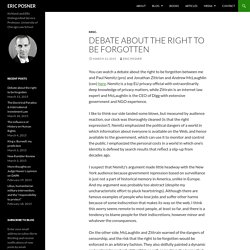
Nemitz is a top EU privacy official with extraordinarily deep knowledge of privacy matters, while Zittrain is an internet law expert and McLaughlin is the CEO of Digg with extensive government and NGO experience. I like to think our side landed some blows, but measured by audience reaction, our clock was thoroughly cleaned (is that the right expression?). Nemitz emphasized the political dangers of a world in which information about everyone is available on the Web, and hence available to the government, which can use it to monitor and control the public. I emphasized the personal costs in a world in which one’s identity is defined by search results that reflect a slip-up from decades ago. Internet Ethics: Views from Silicon Valley. Over the last two weeks, Julia Powles, who is a law and technology researcher at the University of Cambridge, has published two interesting pieces on privacy, free speech, and the “right to be forgotten”: “Swamplands of the Internet: Speech and Privacy,” and “How Google Determined Our Right to Be Forgotten” (the latter co-authored by Enrique Chaparro).
They are both very much worth reading, especially for folks whose work impacts the privacy rights (or preferences, if you prefer) of people around the world. And earlier in February, Google’s Advisory Council issued its much-anticipated report on the issue, which seeks to clarify the outlines of the debate surrounding it and offers suggestions for the implementation of “delisting.” One of the authors of that report, Professor Luciano Floridi, will be speaking at Santa Clara University on Wednesday, 2/25, as part of our “IT, Ethics and Law” lecture series.
Volume 17, No. 1 (Spring 2015) - On the Need for Erasure - The Hedgehog Review: Vol. 17 No. 1 (Spring 2015) Reprinted from The Hedgehog Review 17.1 (Spring 2015).
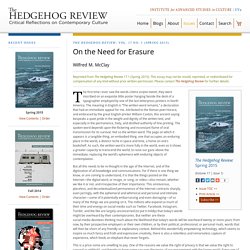
This essay may not be resold, reprinted, or redistributed for compensation of any kind without prior written permission. Does the E.U. âRight to be Forgottenâ Pose a Threat to Companies in U.S.?... Even observed from “across the pond,” the right of European Union (“E.U.”) consumers to compel an Internet search engine to de-link specific personal information of the consumer from certain search results – the “Right to be Forgotten” – has garnered considerable attention in the United States (“U.S.”).
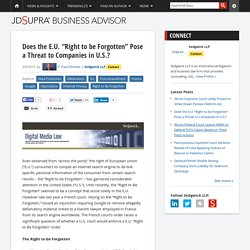
Until recently, the “Right to Be Forgotten” seemed to be a concept that arose solely in the E.U. However late last year a French court, relying on the “Right to Be Forgotten,” issued an injunction requiring Google to remove allegedly defamatory material linked to a Danish lawyer employed in France from its search engine worldwide.
The French court’s order raises a significant question of whether a U.S. court would enforce a E.U. Law360. US v Europe - a cultural gap on the right to be forgotten. 15 May 2014Last updated at 04:08 ET The reverberations from this week's landmark European Court of Justice ruling on the right to be forgotten continue to be felt.
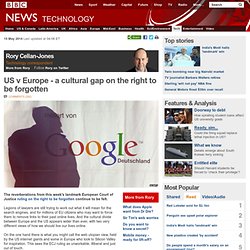
Legions of lawyers are still trying to work out what it will mean for the search engines, and for millions of EU citizens who may want to force them to remove links to their past online lives. And the cultural divide between Europe and the US appears wider than ever, with two very different views of how we should live our lives online. On the one hand there is what you might call the web utopian view, held by the US internet giants and some in Europe who look to Silicon Valley for inspiration. This sees the ECJ ruling as unworkable, illiberal and just out of touch.
“Start Quote The internet shouldn't regurgitate things for ever” End QuoteMax Mosley He tells me this is not necessarily a new cultural gap but one that is being made evident for the first time. The U.S. Should Adopt the "Right to Be Forgotten" Online. For The Motion Paul Nemitz Dir. of Fundamental Rights & Citizenship, DG Justice & Consumers, EU Commission Paul F.

Nemitz is the director for fundamental rights and union citizenship in the Directorate General for Justice and Consumers of the European Commission. The free movement of people in Europe, data protection, and children's rights are also key responsibilities of his Directorate. Learn more Eric Posner Professor of Law, University of Chicago. Europe's `Right To Be Forgotten' Clashes With U.S. Right To Know. Google and the Right to Be Forgotten. On October 31, 2006, an eighteen-year-old woman named Nikki Catsouras slammed her father’s sports car into the side of a concrete toll booth in Orange County, California.
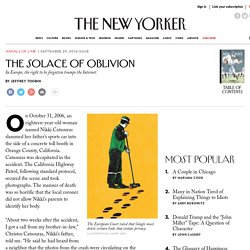
Catsouras was decapitated in the accident. The California Highway Patrol, following standard protocol, secured the scene and took photographs. The manner of death was so horrific that the local coroner did not allow Nikki’s parents to identify her body. “About two weeks after the accident, I got a call from my brother-in-law,” Christos Catsouras, Nikki’s father, told me. “He said he had heard from a neighbor that the photos from the crash were circulating on the Internet. Already bereft of his eldest daughter, Catsouras told his three other girls that they couldn’t look at the Internet.
The situation is different in Europe, thanks to a court case that was decided earlier this year.